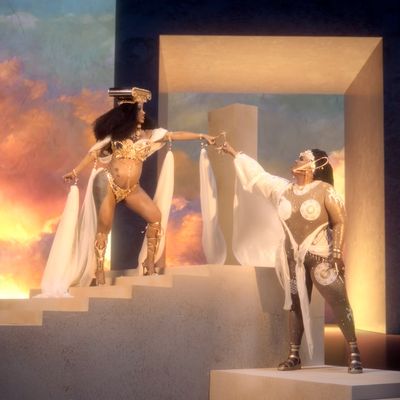
For all the negative attention she gets, you’d think Lizzo would be more of a troublemaker. Her 2019 breakout album Cuz I Love You put her playful rapping and hearty singing to work over an array of clever, slippery pop, rap, rock, and R&B hybrids, and complaints arose about the Midwest performer pandering to white audiences and fishing for commercial placements. She showed skin on magazine covers and twerked at events, and people lost their minds in the way they do when woke standards for body- and sex-positivity are put to the test by the sight of a woman living freely in her sexuality and outside the narrow spectrum of body types historically celebrated in mass media. The eagerness to take Lizzo down a peg for some perceived affront to decency, sparked by behavior as benign as displaying a bit of ass, says much more about us than her. We’re not as forward-thinking as we fancy ourselves. We’re still beholden to outdated 20th-century attitudes toward sex, sexuality, and gender roles, and all too eager to project this baggage on others. The worst Lizzo scandal was broadcasting the name and face of a Postmates driver who failed to deliver an order in 2019, and taking umbrage with music critics after a middling Pitchfork review. Everything else was bullshit, particularly the notion that pop and rock belong to white people. Black artists revolutionized both fields. It’s ours as much as it belongs to anyone else.
That history isn’t lost on Lizzo herself. Tucked away in the back end of “Rumors,” Lizzo’s new single with Cardi B, there’s a couplet – “This shit from my soul, yeah / Black people made rock and roll, yeah” — that implies she’s been listening closely to the dialogue about her work and hating every minute. (“Rumors” isn’t a rock song, necessarily, wailing guitar solo notwithstanding.) She’s talking about you, who thinks her art isn’t Black enough and her body isn’t toned enough and her outfits aren’t demure enough. “Rumors” is a song only these two artists can make, a clapback for anyone who counted these two out or tried to tear them down. Both stars blew up unexpectedly after years of hard work. Cardi’s “Bodak Yellow” crystallized the messages of her early mixtapes and Love and Hip-hop story lines in an undeniable trap banger; Lizzo consolidated her wide-ranging musical interests with “Good As Hell” and suddenly found herself playing in the background of commercials.
Megastardom was an uncomfortable fit. Getting them to comply with the coyness and perfection we demand from pop stars was a losing game. They’re irreverent, funny, and very online, the kind of people who routinely get themselves in trouble for doing or saying too much, the kind of celebrities people love to loathe, the kind of internet poster you can almost expect to hear from if you talk too much shit. Lizzo and Cardi use “Rumors” to remind the audience why they clap back as harshly and as routinely as they do. Women of color get less pay but more rules, less opportunities but more scrutiny.
“Rumors” is a message of solidarity for women of color and women who are made to feel bad about their bodies and urged to conform to restrictive standards of beauty. It says sexiness radiates from within. It’s not assigned to you according to your desirability to others, your value to the male gaze. The video for it resembles the Mount Olympus from Disney’s Hercules. The paintings on the pottery seem alive. Beautiful Black women dance and sing with Lizzo like a Greek chorus. Cardi, glowing and pregnant, sits perched atop a throne like a fertility goddess, owning who she is, where she came from, how she came to be the subject of so much gossip, and why it’s a tiresome business. As is often the case with Lizzo singles, it is a positive and peaceable message served over catchy melodies, a blending of different sounds that runs a touch cloying and a touch clinical.
It’ll be a big hit; it feels almost scientifically engineered to be one. Half a twerk jam and half a radio jingle, “Rumors” locates a cozy middle ground between wholesomeness and raunchiness, between the sacred and the profane. But the journey from the rote, familiar drums and bass underneath the verses to the trippy harmonies and boisterous big-band arrangements around the chorus is too slow of a build. The verses are killer — “Look, I’m a Bronx bitch with some pop hits / Used to pop off when they popped shit / But I’m calmed down and I’m locked in / And my records live in the top 10” — but this music is a little precious coming from the people who made “Boys,” “WAP,” “Scuse Me,” and “Money.” Maybe it needs to be dropped in the middle of a lively function to truly land. For now, though, it’s very pleasant.


